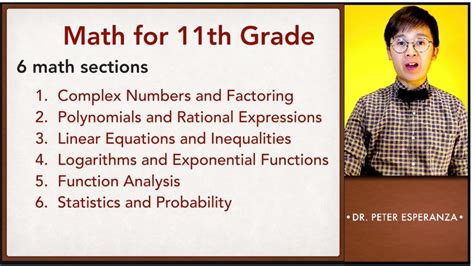Algebra II
Algebra II is a continuation of Algebra I and Geometry, and it is typically taken in the 11th grade. It covers a variety of topics, including:

- Polynomials
- Rational expressions
- Systems of equations and inequalities
- Matrices
- Sequences and series
- Trigonometry
Algebra II is an important course for students who plan to pursue a career in STEM (science, technology, engineering, and mathematics). It provides a strong foundation in the mathematical concepts that are used in these fields.
Pre-Calculus
Pre-Calculus is a course that prepares students for Calculus. It covers a variety of topics, including:
- Functions
- Limits
- Derivatives
- Integrals
- Vectors
Pre-Calculus is a challenging course, but it is essential for students who plan to take Calculus. It provides a strong foundation in the mathematical concepts that are used in Calculus.
Calculus
Calculus is a branch of mathematics that deals with change. It is used in a wide variety of applications, including physics, engineering, economics, and finance. Calculus covers a variety of topics, including:
- Functions
- Limits
- Derivatives
- Integrals
- Differential equations
Calculus is a challenging course, but it is also rewarding. It is a powerful tool that can be used to solve a wide variety of problems.
Other Math Courses
In addition to Algebra II, Pre-Calculus, and Calculus, there are a number of other math courses that 11th graders can take. These courses include:
- Statistics
- Probability
- Math for Business
- Math for the Arts
- Computer Science
These courses can provide students with valuable skills that can be used in a variety of careers.
Why Math Matters
Math is an important subject for all students, regardless of their future plans. It helps students develop their critical thinking skills, problem-solving skills, and communication skills. Math is also used in a wide variety of careers, so it is important for students to have a strong foundation in math.
Here are some of the benefits of studying math:
- Math helps students develop their critical thinking skills. Math requires students to use their logic and reasoning skills to solve problems. This can help students develop their critical thinking skills in other areas of their lives.
- Math helps students develop their problem-solving skills. Math problems can be challenging, but they can also be rewarding. Solving math problems can help students develop their problem-solving skills, which can be used to solve problems in other areas of their lives.
- Math helps students develop their communication skills. Math can be a difficult subject to communicate, but it is important for students to be able to explain their mathematical thinking. This can help students develop their communication skills in other areas of their lives.
- Math is used in a wide variety of careers. Math is used in a variety of careers, including engineering, science, business, and finance. Having a strong foundation in math can help students prepare for a wide range of careers.
Common Mistakes to Avoid
There are a number of common mistakes that students make when studying math. These mistakes can make it difficult for students to learn math and can lead to frustration. Here are some of the most common mistakes to avoid:
- Not practicing enough. Math is a skill that requires practice. Students who do not practice enough will not be able to master the material.
- Giving up too easily. Math can be challenging, but it is important for students to persevere. Students who give up too easily will not be able to learn math.
- Not asking for help. If students are struggling with math, they should not be afraid to ask for help. There are many resources available to help students learn math, including teachers, tutors, and online resources.
Tips for Success
Here are some tips for success in math:
- Practice regularly. The best way to learn math is to practice regularly. Students should set aside time each day to practice math problems.
- Don’t give up. Math can be challenging, but it is important for students to persevere. Students should not give up if they do not understand something right away.
- Ask for help. If students are struggling with math, they should not be afraid to ask for help. There are many resources available to help students learn math, including teachers, tutors, and online resources.
- Break down problems into smaller steps. Math problems can be daunting, but they can be more manageable if students break them down into smaller steps.
- Check your work. It is important for students to check their work after they have solved a math problem. This will help them to identify and correct any mistakes.
Conclusion
Math is an important subject for all students, regardless of their future plans. It helps students develop their critical thinking skills, problem-solving skills, and communication skills. Math is also used in a wide variety of careers, so it is important for students to have a strong foundation in math.
By following the tips in this article, students can set themselves up for success in math.
